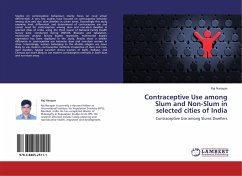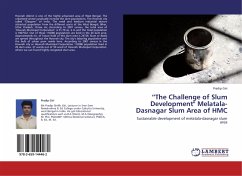Studies on contraceptive behaviours mainly focus on rural urban differentials. A very few studies have focused on contraceptive behavior among slum and non slum dwellers in urban areas. Accordingly this study examines level, differential, and determinant of contraceptive use and unmet need for contraception among slum and non-slum dwellers in selected cities of India, using the third round of National Family Health Survey data, conducted during 2005-06. Bivariate and tabulation, multivariate analysis (binary logistic regression, multinomial logistic regression) has been deployed in the study. Results show a smaller difference in contraceptive use between slum and non-slum women in cities. Interestingly, women belonging to the Muslim religion are more likely to use modern contraceptive methods irrespective of slum and non-slum dwellers. Spatial variation shows women of Delhi, Kolkata, and Chennai are more likely to use modern contraceptive methods in both slum and non-slum areas.








